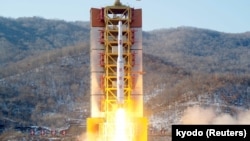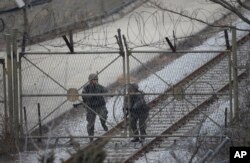The U.S. Senate is expected to approve tougher sanctions against North Korea as early as Wednesday, just days after Pyongyang launched a long-range rocket capable of carrying a nuclear payload, and weeks after it conducted a nuclear test.
“It’s going to pass overwhelmingly,” Republican Bob Corker, the chairman of the Senate Foreign Relations Committee, told VOA.
The Senate will pause extended deliberations on an energy bill to take up the North Korea sanctions legislation. At least seven hours of floor debate have been scheduled, followed by a vote.
“Clearly what’s happened in North Korea is extremely serious,” said Sen. Ben Cardin, the Foreign Relations Committee’s ranking Democrat. “I would hope there would be no ambiguity at all in American policy on isolating North Korea.”
Approved by the committee last month, the bill seeks to punish entities in China and elsewhere that help North Korea continue its nuclear program or finance its military complex.
“We need to make sure the Chinese pay a price on this,” Republican Sen. John McCain told VOA. “They [North Korea] would collapse without Chinese support in a month.”
‘More pressure’ needed
Several amendments could be considered, including one requiring the Obama administration to provide Congress with any information it has on nuclear and ballistic missile cooperation between North Korea and Iran.
The administration is withholding direct comment until a final bill reaches the president’s desk.
"I am not certainly going to get ahead of legislation pending or being discussed on Capitol Hill,” State Department spokesman John Kirby said Tuesday. "Obviously, the United States has — as we always have had — the ability to unilaterally apply sanctions to meet certain ends.
“We firmly believe that the international community has got to apply more pressure on the North," Kirby added.
The U.N. Security Council strongly condemned North Korea’s long-range rocket launch, and said it stands ready to “develop significant new measures” to rein in Pyongyang’s behavior.
Skepticism over U.N.
On Capitol Hill, lawmakers of both parties expressed skepticism about new U.N. sanctions, and said the United States must speak with one voice.
“I’m not hopeful that China will join in doing anything,” Corker said. “It’s pretty hard for the White House to push back against what we’re doing when it’s evident that the U.N. Security Council itself is not going to be effective in dealing with this.”
Cardin agreed.
“This is a congressional prerogative,” he said. “We are disappointed that the United Nations has not acted. They have had an opportunity to act. So we hope that what we do here [in Congress] will facilitate international action and isolate North Korea if they continue to go down this path.”
China is under pressure to support tough new sanctions against Pyongyang, but is reported to be balancing the need for action with concerns about creating instability in North Korea.





